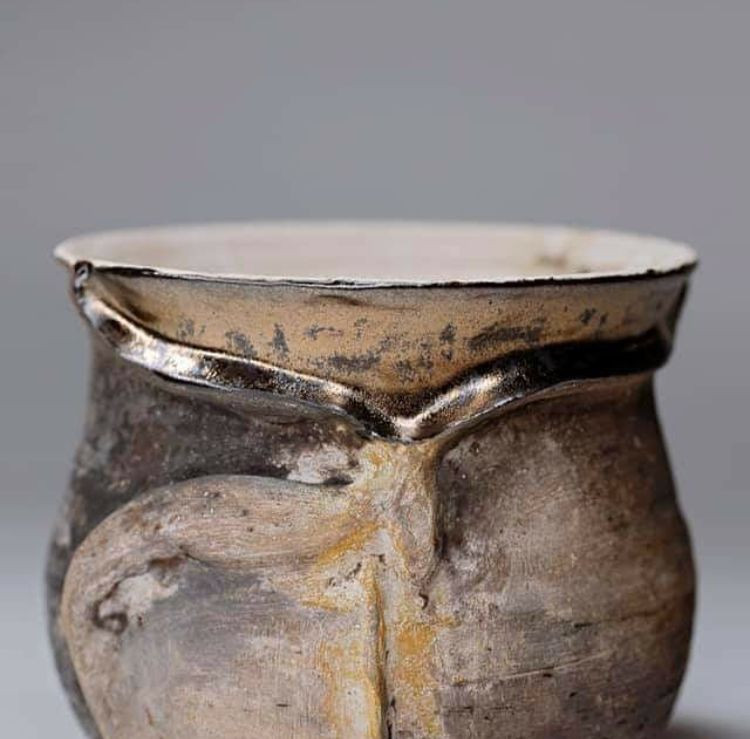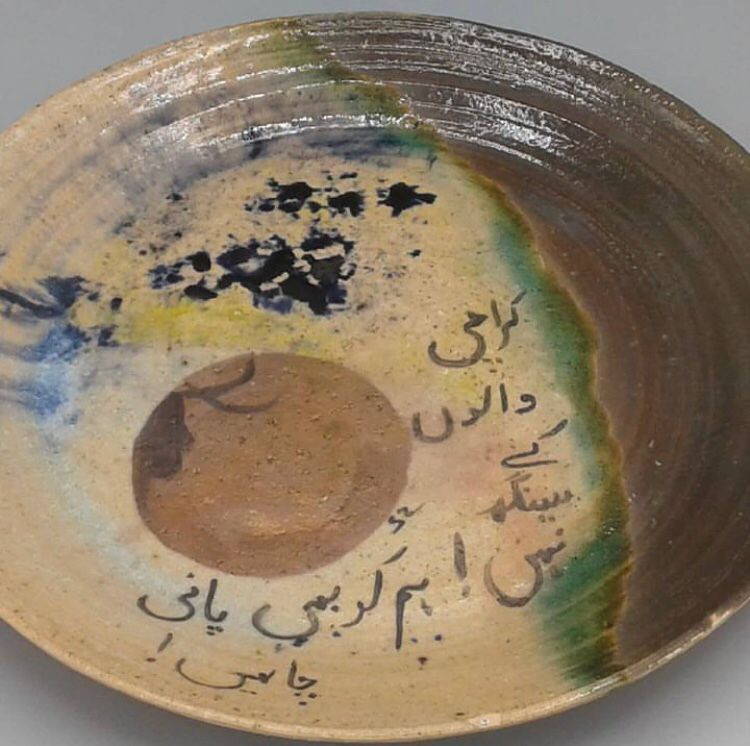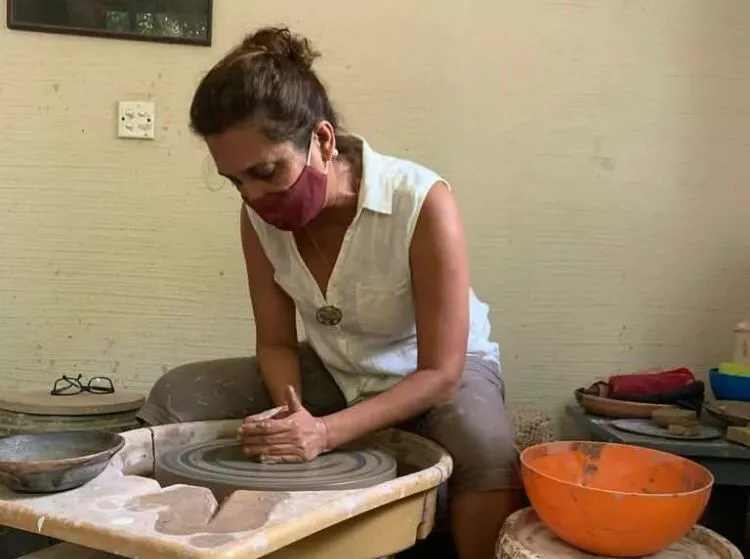Perils of a Potter in Pakistan: A glimpse into the clay world of contemporary artist Shazia Zuberi
Her art revolves around absorbing the environment, conserving nature, and paying homage to colours and landscapes
KARACHI:Shazia Zuberi's fascination with clay began during her teenage years at boarding school. The malleable nature of clay and its transformative possibilities captivated her. She found working with clay to be cathartic, sensual, and addictive, with endless avenues for exploration.
In 2009, she left her job and created a dedicated space in her backyard, embarking on her journey as a full-time potter. Her studio, named 'Earthwarestudios,' reflects her welcoming, grounding, and functional approach to both her personal life and artistic work.
She creates functional pottery such as dinnerware and figurative art such as ceramic head sculptures, making her work unorthodox.
Zuberi's art revolves around absorbing the environment, conserving nature, and paying homage to the colours and landscapes of the natural world. She highlights the delicate balance between humans, who rely on nature, and nature, which depends on humans. Many of her earlier works draw inspiration from Pakistan's national animal, the Markhor, found in the northern mountains. Symbolically, she uses the Markhor to represent the challenges she faces as an artist.
"It is my way of expressing harmony," she explains.

Cry for clay
Zuberi explains that most potters in Pakistan cannot afford to import high-quality clay due to heavy import duties, making it prohibitively expensive. “The locally available clay, known as lal mitti or earthenware clay, is fantastic in some aspects, but it lacks standardisation, often containing excessive sand and iron oxide,” she says. Additionally, it may have impurities that render it unsuitable for glazing and use with juices or acidic food items. However, it is excellent for storing water, as its porous nature allows for breathability and cooling.
To overcome these limitations, Zuberi has developed her own stoneware clay, which is also safe for food consumption. However, since potters must create the clay and prepare glazes themselves, the end product varies each time and lacks standardisation. This leads to delays, as raw materials often contain impurities that require a time-consuming and lengthy cleaning process. If the clay does not meet the desired standards, the entire process must be repeated, resulting in a waste of limited resources.
Zuberi faces numerous inconsistencies in developing a clay body using local materials. Recently, it took her seven months to identify and address issues with the china clay she was using, leading to a series of wasted efforts and trials.
“Dealing with such technical challenges detracts you from the creative process,” she laments. Unlike potters in other parts of the world, who can focus solely on their art, Pakistani potters face additional hurdles that impede their creative freedom. “It doesn't have to be so hard. The question is, why is it so difficult for potters here?”
In Zuberi’s opinion, there are a number of factors but the most important being that the Pakistani Government does not sufficiently appreciate and celebrate this craft. “Countries like Japan take pride in their artisans (shokunin). The government there not only provides platforms for potters but also honours and recognises their contributions,” asserts Zuberi.
1684129329-3/WhatsApp-Image-2023-05-15-at-10-37-08-AM-(1)1684129329-3.jpeg)
She also believes that the naturally occurring clay found in Pakistani grounds and river beds should be preserved, standardised, and made available in local markets for easy access. Zuberi, who was recently on a visit to the mud volcanoes in Balochistan discovered clay formations in Balochistan’s coastal areas. She noticed that the ground she was walking on was clay, realizing that this valuable resource was either going to waste or being mined without regulations.
“I realised that the ground I was walking on was made of clay which also made me think how this valuable resource was either going to waste or being mined without regulations.”
Building bridges
Zuberi has also been collaborating with craft families in interior Sindh through her studio, Earthwarestudios. She has observed that these kumhars (potters) in rural communities are among the poorest and face social marginalisation. They struggle to earn enough to sustain themselves and their art.
“Pottery, as an art form, is fading away in Pakistan. Its decline can be attributed to a scarcity of standardised materials and a haphazard chemical market, coupled with a lack of appreciation for the craft.”
However, she remains optimistic about the demand and potential for pottery in the country. Those who value artistic expression do purchase her work, and she manages to sell up to 85% of her creations. Zuberi also frequently organises solo and group pop-up shows at venues like Tali in Karachi, where she receives a warm reception.
1684129329-4/WhatsApp-Image-2023-05-15-at-10-37-07-AM-(2)1684129329-4.jpeg)
To address this disparity, Zuberi aspires to establish an online outlet that provides local artisans and craftsmen with a non-traditional market to sell their products. She suggests that the government standardise raw materials, establish cooperatives where local potters can sell their work, and implement price controls to ensure fair compensation and recognition for potters.
“Promoting e-commerce opportunities for local potters, both skilled and beginners and fellowships to participate in fellowships abroad, such as in Japan, could also be game-changers,” Zuberi suggests.
On a different note, Zuberi expresses her disappointment with the cliquish nature of the art community in Pakistan. She believes that individual artists are not celebrated enough, and only a small community of like-minded individuals truly recognise their contributions.
Although her studio is her ultimate sanctuary, she admits it gets lonely. She aims to create a safe space for local ceramicists so that they can exchange ideas about their shared appreciation for clay craft and encourage other upcoming artists to continue on this path.
1684129329-0/WhatsApp-Image-2023-05-15-at-10-37-09-AM-(2)1684129329-0.jpeg) For the past five years, there has been significant global awareness and interest in organic and mindful practices, such as spirituality, meditation, and clean eating. Despite this, Zuberi believes there is an underlying bias against potters worldwide. “Ceramicists in the art world face discrimination and now is time to challenge these conventions,” she concludes.
For the past five years, there has been significant global awareness and interest in organic and mindful practices, such as spirituality, meditation, and clean eating. Despite this, Zuberi believes there is an underlying bias against potters worldwide. “Ceramicists in the art world face discrimination and now is time to challenge these conventions,” she concludes.
Zuberi sums up her experience as a potter in Pakistan for almost 25 years now, as being celebrated, but mostly neglected.
Have something to add to the story? Share it in the comments below.


COMMENTS
Comments are moderated and generally will be posted if they are on-topic and not abusive.
For more information, please see our Comments FAQ